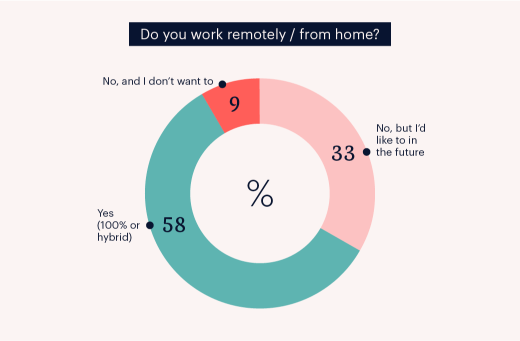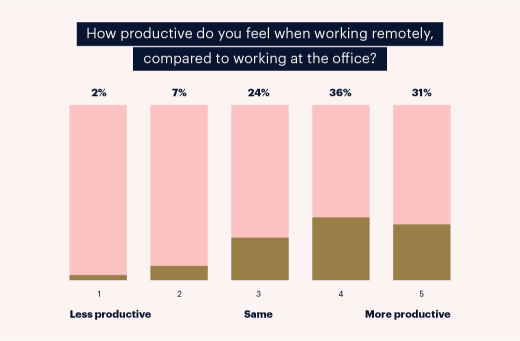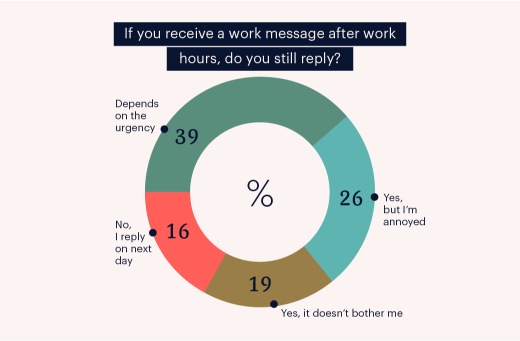Beyond Remote Work
2022/2023 Report
We interviewed hundreds of our customers to find out!
We surveyed hundreds of our customers to learn what remote workers actually want.

“Remote work brings with it a wave of uncertainties for many employers. Worries about productivity dips, communication gaps, and maintaining a cohesive company culture are common.
Yet, it seems that remote work has become a key factor in hiring and retaining top talent in many industries.
To help employers keep up with this trend, we thought — Why not survey our user base to learn what remote workers and job seekers actually want?
We turned to them to hear about their experiences and wrapped it all in this report.
We hope this report will be useful to all businesses that are operating remotely, hiring remotely, or are just considering starting to hire remote workers.” — Peter Duris, CEO of Kickresume
Explore survey results.
1. Remote work is here to stay.

Most of the workers surveyed are already working remotely or would love to do so in the future. Only fewer than 9% expressed a desire to remain on-site.
What’s more, nearly 55% said they would change jobs if not allowed to continue working remotely, while more than 32% would at least consider changing jobs in such a case. This indicates that business may want to embrace a more liberated work environment if they hope to retain the best talent.
2. Remote workers are happier workers.

An overwhelming majority of remote workers (97%) said that they are either totally happy or at least a bit happier now that they work from home.
When it comes to remote work models, hybrid and fully remote options are almost equally common. Still, the data suggest that employees are the happiest under the fully remote work model.
3. They are also more productive.

Most workers (67%) feel more productive working remotely than at the office. They also work longer hours.
This could be due to a variety of factors, including reduced distractions, increased flexibility, and the ability to work in a more comfortable environment. What’s more, nearly 48% have also reported working longer hours than before switching to remote work, while about 35% said they work the same number of hours.
4. And they really have nothing to hide.

While only 53% of surveyed remote workers are required to track their work hours and productivity, most of them don’t mind.
Interestingly, our survey has also revealed that there are no major differences in remote work satisfaction between employees who were being monitored by their employers and those who were not.
5. But they do like their privacy after hours.

Nearly 40% of respondents reported receiving work-related messages after working hours. Only 19% don’t mind.
To avoid this, employers should create clear expectations around working hours, when and how often employees are expected to respond to such requests, or ideally, not contact them outside of those hours, except in urgent cases. Actually, in some countries, it is even illegal, such as Germany, Portugal, and Belgium.
6. Remote work often is not that remote.

Most workers did not relocate after transitioning to remote work. They simply enjoy not having to commute every day.
Still, there is a significant portion of remote workers who have taken the opportunity to relocate, either permanently or temporarily, potentially to explore new environments or reduce living costs. Out of those that did relocate, 42% relocated to another town and 35% to another country.
7. So, what is the future of remote work?

Only 7% of remote workers would like to return to the office full-time. On the other hand, more than 56% like to go back to the office at least sometimes.
Overall, it seems that remote work is here to stay and will remain popular in the coming years. However, this trend could be disrupted by the rapid development of AI and large language models which are more likely to replace jobs that can be performed remotely.
Key Takeaways
- More than half of surveyed workers (58%) worked remotely in 2022. And 70% of them started working remotely due to the Covid pandemic.
- 45% of the surveyed workers have traded an on-site job for a remote job since the pandemic started.
- Remote work is almost evenly split between the two models, with 51% of people having hybrid remote work arrangements and the remaining 49% working fully remotely.
- An overwhelming majority of remote workers (97%) said that they are either totally happy or a bit happier not that they are working from home. But the level of satisfaction also seems to increase with the seniority level, with interns having the highest portion of unsatisfied workers (9%).
- The top reasons why workers like remote work are a flexible schedule (62%) and better work‑life balance (59%).
- Still, almost half of the remote workers (48%) reported that they work more hours now than in the office.
- Nearly 40% of people get work-related messages after work hours.
- 61% of remote workers earn the same salary as they did before they started working remotely.
- From the top five benefits remote workers most care about, they normally only get two. They mainly look for benefits closely tied to their remote work expenses, such as compensation for internet, electricity, and technology and office furniture stipend.